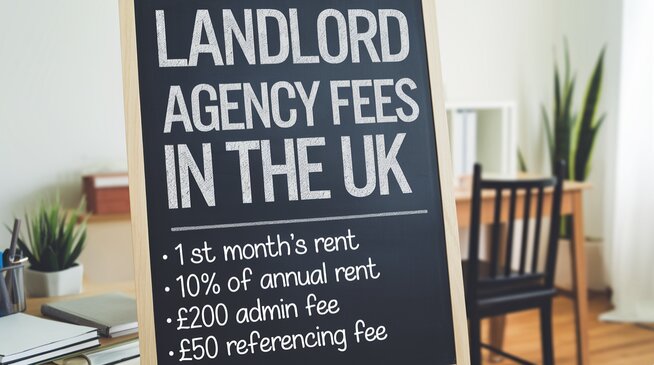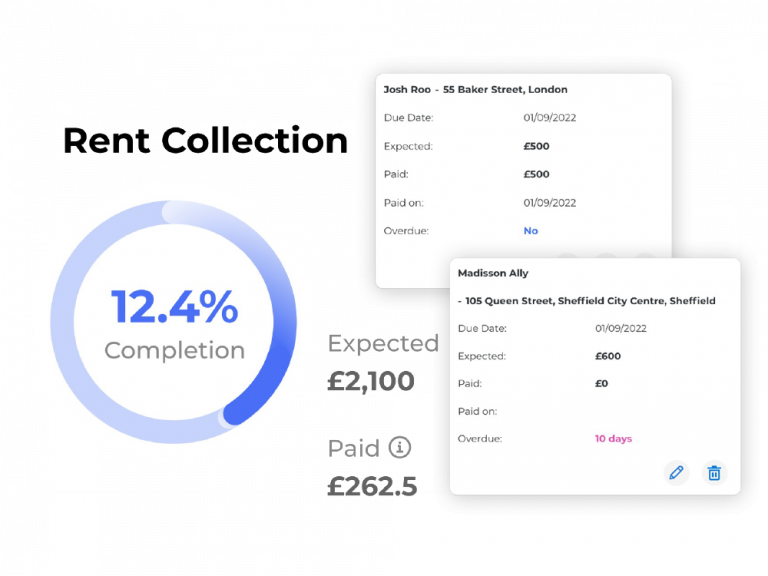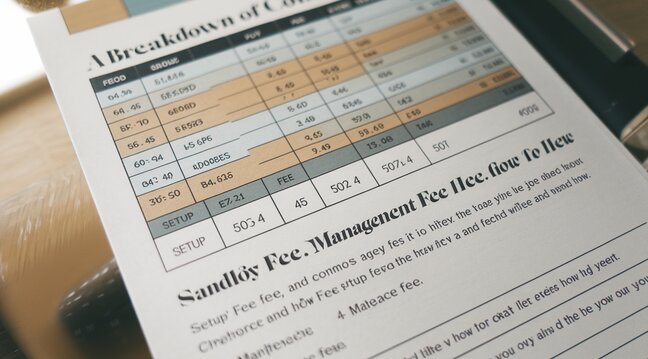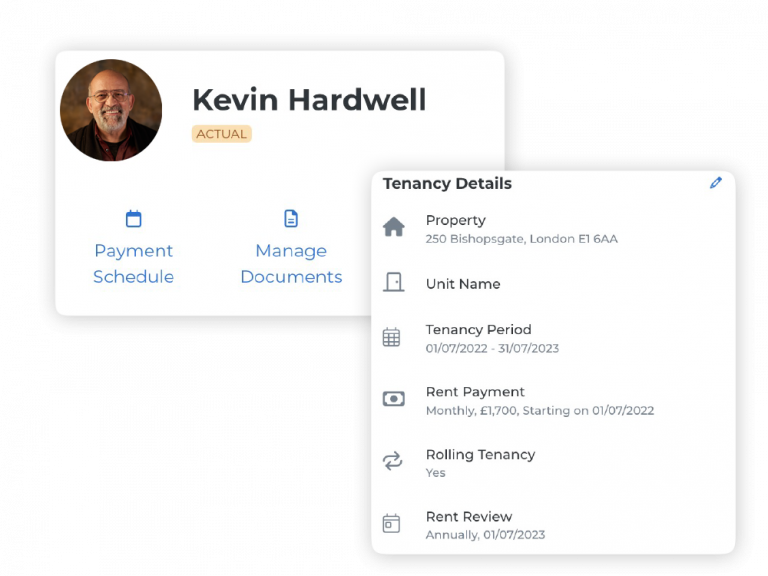A Breakdown of Common Landlord Agency Fees and How to Avoid Them
Letting agents charge landlords various fees for managing their properties. The issue directly impacts landlords' profitability and affordability, contributing to ongoing discussions about transparency and fairness.
Table of Contents
For landlords seeking to maximize financial outcomes and avoid hidden or excessive charges, understanding these fees is critical. Landlords typically encounter several categories of fees, including “let only” service fees, full management service fees, and additional charges for specific services such as advertising, tenant referencing, and compliance checks. For instance, “let only” services can range from two to four weeks’ rent, while full management services may cost between 10% to 15% of monthly rent.
Online letting agents have also changed the landscape, providing competitive pricing compared to traditional high street agents. However, this comes with a trade-off in terms of service level.
An important development in this regard is the Tenant Fees Act 2019, which aims to protect tenants from exorbitant fees. This legislation restricts the types of fees landlords and agents can charge, aiming to foster a more equitable environment for all parties involved.
In order to ensure compliance with these regulations, local trading standards authorities can impose significant penalties on non-compliance.

Navigating landlord agency fees requires vigilance and informed decision-making. Landlords are encouraged to thoroughly review fee structures, conduct market comparisons, and maintain detailed records of transactions to protect themselves from unfair charges. By adopting these strategies, landlords can effectively mitigate potential financial burdens and enhance property management experiences.
Types of Common Fees
Right now, landlords across the UK are stepping onto the pitch, facing a formidable opponent: letting agent fees! In the event that you aren’t prepared, these charges can really dent your finances. Just like knowing when to make that precise pass, understanding these fees is key to staying ahead in the game. With a bit of savvy, you can dodge unnecessary costs and negotiate better terms—because, let’s be honest, who doesn’t love a win in extra time?
Save Landlord Agency Fees With Lendlord – Tenants Management Made Easy!
Standard Letting Agent Fees
Letting agents, much like a well-drilled Premier League squad, charge fees based on the services they offer, and these can be split into several key positions. Each type of fee has its role—whether it’s upfront for finding tenants or ongoing for managing the property—every charge is part of the game plan.
Let Only Service Fees
Landlords going for the “let only” service are stepping into a solid formation, with fees typically ranging from two to four weeks’ rent. It’s a mixed bag depending on who’s in your lineup—smaller independent agents might charge as little as £200, while big names like Belvoir are asking around £250 plus VAT. This fee covers the essentials: finding tenants, advertising the property, conducting viewings, and getting those tenancy agreements signed—basically, all the prep before the big kickoff!
Full Management Service Fees
For landlords opting for the full management service, it’s like bringing in a star manager to handle the squad. The fees typically run between 10% to 15% of the monthly rent, meaning an annual cost of over £2,000 per property, based on the national average.
But you’re getting the full works—rent collection, maintenance management, and being the main point of contact for tenants. It’s a hands-off strategy, letting the pros handle the day-to-day, while you sit back and enjoy the match from the stands!
Additional Charges
In addition to the standard fees, landlords can find themselves facing extra charges for specific services, much like unexpected substitutions in the second half.
Advertising and marketing costs might see agents taking a slice of the rental price for promoting the property.
Then, there’s the reference check fee—usually a flat rate for vetting potential tenants. Agents often tack on tenancy agreement fees, which vary by agency, and don’t forget about compliance and safety checks for things like Gas Safety Certificates and EPCs.
Finally, there’s the check-in/check-out fee—some agencies will charge for handling those property handovers!
Rent Collection Fees
Landlords opting to outsource rent collection are making a tactical substitution, but it comes at a price—typically an extra 5% to 10% of the monthly rent.
If you don’t want to chase down late payments like a last-minute equalizer, this service is a lifesaver. It’s perfect for landlords who prefer to stay out of the day-to-day action and let the pros handle the follow-ups, ensuring cash continues to flow.

Online vs. High Street Agents
Online letting agents have really altered the game of property management, bringing a fresh level of competition compared to traditional high street agents, whose overheads tend to be higher. They might have lower price tags, but they often leave landlords playing a central midfield role, managing tasks themselves.
It’s all about deciding if you want to be the star player or let the agents do the heavy lifting. Fee structure is key to staying on top of your property. Before signing, always check what’s included, so you don’t get caught offside by hidden charges!
Regulations and Legal Considerations
Tenant Fees Act 2019
The Tenant Fees Act 2019 is a game-changer, protecting tenants from over-the-top letting fees while promoting transparency.
Landlords and letting agents are clearly outlined what’s allowed, what’s restricted, and what’s a straight-up red card. It even caps deposits, ensuring tenants aren’t sidelined by hefty upfront costs.
These rules level the playing field, aiming to make renting more affordable and accessible for everyone involved in the property game.
Enforcement Authority
Local trading standards authorities and district councils are like the VAR team, reviewing every move to ensure compliance with the Tenant Fees Act. They’ve got the power to intervene when landlords or letting agents make illegal plays, such as charging prohibited fees or mishandling holding deposits.
With the ability to hand out fines like yellow cards, they ensure everyone’s staying onside and following the rules. It’s all about keeping the rental market fair and making sure no dodgy tactics slip through unnoticed!
@nwpropertymum THE MISTAKE 👇🏻 They don't use tools to get organised and make their life easier! For years I used spreadsheets to manage finances, calendars to manage maintenance and relied on phone calls, voicemail and email to contact tenants.🥱 But actually, using the right tools can make things so much easier and quicker.✔️ I used to find messages about maintenance get lost and tenants wouldn't be in when workmen arrived. But having one clear method of contacting, updating and confirming through my @Lendlord_UK app makes life so much simpler as a landlord. A leaking tap can literally be addressed in seconds! 🚰 Lendlord are also offering 40% off with my link so if you want to get more organised, you can do it for less! #lendlord #landlord #buytolet #ad ♬ original sound - nwpropertymum 🏡 property tips
Financial Penalties
Enforcement authorities are like the stewards of the property market, ready to hand out fines if they catch landlords or agents stepping out of line.
If they’ve got enough evidence to be convinced that the tenant fees rules have been breached, they can slap a hefty penalty—starting with a cool £5,000 for a first offense.
But if the offenses keep piling up, the fines can climb all the way to £30,000, like a transfer fee for a star player. It’s a clear signal to play by the rules, or face some serious financial consequences!
Notification Procedures
When enforcement authorities decide to make a play on breaches happening outside their home turf, they’ve got to pass the ball to the local weights and measures authority, as well as the relevant housing authority. This teamwork ensures everyone’s on the same page and that the whole defense is locked down.
It’s all about communication, coordination, and making sure no one slips through the cracks. With everyone working together, the rules get enforced properly, keeping the property market playing a clean and fair game!
Increased Buying Power
Borrowers can use their current real estate assets like a top striker capitalizing on a golden opportunity, leveraging them to secure bridge loans and boost their buying power.
It’s a fast-paced move, allowing them to expand their property portfolios quickly and seize those lucrative investment chances. In the end, it’s all about strengthening their financial position and staying ahead in the property game.
Limitations on Claims
Though there’s no set deadline for bringing a claim under the Tenant Fees Act, trying to take a shot more than six years after a breach could be a tough one to pull off.
Thanks to the Limitation Act 1980, landlords or agents might have a strong defense, blocking any claims that come in after the whistle has blown on that time frame.
Renters don’t have to worry about unfair tactics in the rental market, thanks to these rules and enforcement measures.
How to Avoid Excessive Fees
Landlords and tenants need to stay sharp when working with letting agents to avoid excessive or unfair fees. Keeping costs in check and ensuring smooth dealings can go a long way in making the renting process less stressful.
Understanding Fee Structures
Before putting pen to paper, it’s crucial to carefully examine the fee structures of letting agents. Be mindful of potential charges, like administration fees, check-out fees, and even default fees for late payments or lost keys.
Knowing what’s allowed and what’s not under current legislation is key, as overcharging for certain services could land the agent in hot water with consumer protection laws. Taking the time to fully understand these details ensures you’re not caught off guard by any sneaky costs down the line.
Research and Comparison
Conducting market research arms landlords with the insights needed to make savvy choices. By comparing the fees charged by various letting agents in your area, you can pinpoint the standard rates and services on offer.
This information can give you an edge in negotiations, ensuring you’re getting a fair deal. Being aware of the typical range for full property management fees, which usually sit between 8% and 12%, will also help you avoid overpaying and keep your finances in check.
Disputing Unfair Charges
If you’re convinced you’ve been hit with excessive fees, don’t just take it on the chin – you’ve got the right to challenge them. First, take it up with the letting agent, laying out your case with solid reasoning.
Should this not settle the score, you can step things up and involve dispute resolution services like the Property Ombudsman. If it’s about deposits, tenancy deposit protection schemes are also there to back you up. Just like a well-timed comeback, there’s always a way to turn the situation around and get a fair result.
Negotiation Techniques
Negotiation is like setting up the perfect play to avoid getting hit with unnecessary fees. When you’re in talks with letting agents, focus on the services you actually need and be willing to tweak the lineup if it helps reduce costs.

Establishing a good rapport during these negotiations can help you score some flexibility from them. Just like in any winning strategy, teamwork and understanding often lead to the finest outcomes.
Keeping Records
Keeping track of all your transactions and communications with your letting agent is crucial for staying on top of the game. This means filing away everything from agreements and receipts to emails about fees. Think of it like having instant replays ready if a disagreement pops up.
By staying organized and documenting every move, you give yourself a solid defense if you ever need to challenge a fee or revisit the terms. It’s all about having your strategy fully prepared when you need to make your next big play.
Legal Support and Guidance
If you suspect you’re being hit with unfair or excessive fees, bringing in some professional expertise could make all the difference.
Whether it’s the Citizens Advice Bureau or housing law specialists, these pros are like top-tier coaches ready to guide you through the process.
They’ll break down your rights and help craft a solid strategy for tackling those questionable charges.
With these resources, both landlords and tenants can steer through the complexities of letting agent fees with confidence, staying on top of their finances without falling foul of hidden costs.
DIY Property Management vs. Paying Agency Fees: Which is Better?
As a UK landlord, you’re likely debating whether to run the show yourself or bring in a letting agency to take the lead.
Both tactics have their ups and downs, and finding the right formation depends on how much time you’ve got on your hands, your experience, and of course, your financial game plan.
Let’s break down the pros and cons of DIY property management versus paying those agency fees, so you can figure out the best play for your rental strategy.
The Pros and Cons of DIY Property Management
Taking the DIY route means you’re playing in every position on the field, from tenant scouting to maintenance and legal paperwork.
The major upside?
You save on letting agency fees, which can take a 5% to 15% bite out of your rental income. Plus, you call all the shots, from tenant selection to property decisions, perfect for those who prefer being hands-on.
But it’s not all smooth sailing.
Managing everything yourself is like playing a full 90 minute solo game. The workload adds up quickly between marketing, tenant vetting, and handling repair calls. If you’re not well-versed in UK property law, one slip-up could lead to costly fines or disputes.
The Benefits of Using a Letting Agency
Please give the following paragraph a professional yet funny tone. Please don’t make the paragraph much longer from the original paragraph I provide. Please give it a sporty tone of a correspondent in a middle a UK Premier League game but do the adjustments from sport for property investments. Please don’t use “—” in your output.
Please make sure to use different words of Premier League and Soccer vocabulary world in every new paragraph you generate (for example don’t repeat the phrase “red card” or the word “pitch” or “referee” or “game-changer”). Please don’t address the readers when starting the paragraph. Here is the paragraph:

Which Option is Right for You?
If you’ve got the time, expertise, and the energy to stay in control, DIY management might just be your winning strategy. But if you’d rather play from the sidelines and leave the heavy lifting to the pros, paying agency fees could be the smarter move. It all comes down to how much you’re willing to put in versus what you want out of the game. Take stock of your resources and long-term goals before deciding which play is right for you.
Sign Up for Free Today & Get 40% Off Lendlord Premium Plan!



